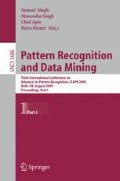Abstract
In this paper, Multi-View Expectation and Maximization (EM) algorithm for finite mixture models is proposed by us to handle real-world learning problems which have natural feature splits. Multi-View EM does feature split as Co-training and Co-EM, but it considers multi-view learning problems in the EM framework. The proposed algorithm has these impressing advantages comparing with other algorithms in Co-training setting: its convergence is theoretically guaranteed; it can easily deal with more two views learning problems. Experiments on WebKB data demonstrated that Multi-View EM performed satisfactorily well compared with Co-EM, Co-training and standard EM.
Access this chapter
Tax calculation will be finalised at checkout
Purchases are for personal use only
Preview
Unable to display preview. Download preview PDF.
References
Blum, A., Mitchell, T.: Combining labeled and unlabeled data with co-training. In: Proceedings of the 11th Annual Conference on Computational Learning Theory, pp. 92–100 (1998)
Muslea, I., Minton, S., Knoblock, C.A.: Active + semi-supervised learning = robust multi-view learning. In: Proceedings of ICML 2002 (2002)
Nigam, K., Ghani, R.: Analyzing the effectiveness and applicability of co-training. In: Proceedings of Information and Knowledge Management, pp. 86–93 (2000)
Bilmes, J.A.: A gentle tutorial of the em algorithm and its application to parameter estimation for gaussian mixture and hidden markov models. Technical report, ICSI Technical Report TR-97-021,UC Berkeley (1997)
Nigam, K., Mccallum, A., Thrun, S., Mitchell, T.: Text classification from labeled and unlabeled documents using em. Machine Learning 39, 103–134 (2000)
Rogati, M., Yang, Y.: High-performing feature selection for text classification. In: Proceedings of the eleventh international conference on Information and knowledge management, McLean, Virginia, USA (2002)
Suen, C.Y.W., Lam, L.: Analyzing the effectiveness and applicability of co-training. In: Proceedings of the First International Workshop on Multiple Classifier Systems (MCS 2000), Cagliari, Italy, pp. 52–66 (2000)
Author information
Authors and Affiliations
Editor information
Editors and Affiliations
Rights and permissions
Copyright information
© 2005 Springer-Verlag Berlin Heidelberg
About this paper
Cite this paper
Yi, X., Xu, Y., Zhang, C. (2005). Multi-view EM Algorithm for Finite Mixture Models. In: Singh, S., Singh, M., Apte, C., Perner, P. (eds) Pattern Recognition and Data Mining. ICAPR 2005. Lecture Notes in Computer Science, vol 3686. Springer, Berlin, Heidelberg. https://doi.org/10.1007/11551188_45
Download citation
DOI: https://doi.org/10.1007/11551188_45
Publisher Name: Springer, Berlin, Heidelberg
Print ISBN: 978-3-540-28757-5
Online ISBN: 978-3-540-28758-2
eBook Packages: Computer ScienceComputer Science (R0)

